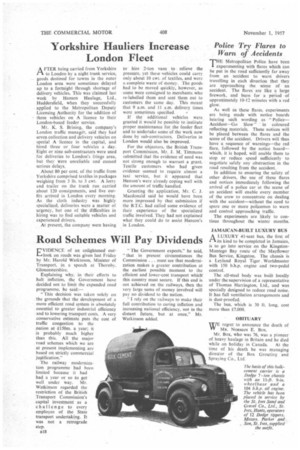Yorkshire Hauliers Increase London Fleet
Page 52

If you've noticed an error in this article please click here to report it so we can fix it.
AFTER being carried from Yorkshire to London by a night trunk service, goods destined for towns in the outer London area were sometimes delayed up to a fortnight through shortage of delivery vehicles. This was claimed last week by Hanson Haulage, Ltd., Huddersfield, when they successfully applied to the Metropolitan Deputy Licensing Authority for the addition of three vehicles on A licence to their London-based feeder service, Mr. K. S. Brining, the company's London traffic manager, said they had seven collection and delivery vehicles on special A • licence in the capital, and hired three or, four vehicles a day. Eight or nine sub-contractors were used for deliveries to London's fringe area, but they were unreliable and caused serious delays,
About 80 per cent, of the traffic from Yorkshire comprised textiles in packages weighing from 3 lb. to 3 cwt. A lorry and trailer on the trunk run carried about 120 consignments, and five outfits arrived in London every morning. As the cloth industry was highly specialized, deliveries were a matter of urgency, but one of the difficulties in hiring was to find suitable vehicles and experienced drivers.
At present, the company were having to hire 2-ton vans to relieve the pressure, yet these vehicles could carry only about 10 cwt. of textiles, and were a complete waste of money. The goods had to he moved quickly, however, as some were consigned to merchants who re-labelled them and sent them out to customers the same day. This meant that 9 a.m. and 11 a.m. delivery times were sometimes specified.
If the additional vehicles were granted it would be possible to institute proper maintenance for the feeder fleet and to undertake some of the work now done by sub-contractors. Deliveries in Landon would also be improved.
For the objectors, the British Transport Commission, Mr. J. M. Timmons submitted that the evidence of need was not strong enough to warrant a grant. Textile customers who had given evidence seemed to require almost a taxi service, but it appeared that Hanson's were already coping well with the amount of traffic handled.
Granting the application, Mr. C. J. Macdonald said he would have been more impressed by that submission if the B.T.C. had called some evidence of their experience of the specialized traffic involved, They had not explained what they could do to assist Hanson's in London.
























































































































